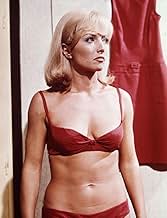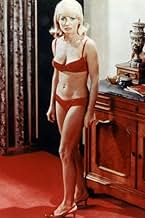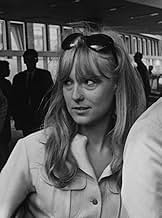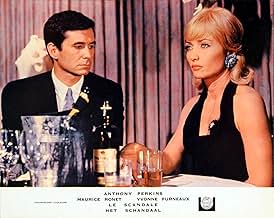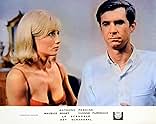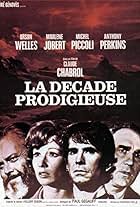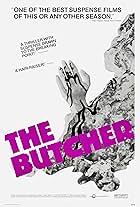A champagne tycoon's (Furneaux) partner (Ronet) suspects his partner's gigolo husband (Perkins) of murders he's been framed for.A champagne tycoon's (Furneaux) partner (Ronet) suspects his partner's gigolo husband (Perkins) of murders he's been framed for.A champagne tycoon's (Furneaux) partner (Ronet) suspects his partner's gigolo husband (Perkins) of murders he's been framed for.
- Awards
- 1 win total
Henri Attal
- Attacker in Dark Coat
- (uncredited)
Robert Burnier
- General at Evelyn's Party
- (uncredited)
Colin Drake
- Evelyn's Party Guest
- (uncredited)
Pierre Gualdi
- Bishop at Evelyn's Party
- (uncredited)
Raoul Guylad
- Customer at Denise's Shop
- (uncredited)
Catherine Langeais
- Evelyn's Party Guest
- (uncredited)
Featured reviews
This is not really an early Chabrol who had already been making films for over fifteen years but it does come just before he fully got into his stride and his golden period began with Le Boucher. Fascinating here to see Anthony Perkins with Maurice Ronet and the lovely Stephane Audran, not sure if he knew English or was dubbed but he looks fine. Trouble here is that Chabrol takes forever setting this up and we have to spend what seems an interminable amount of time as the rich are seen to party pathetically with their business transactions forever hovering. Once things do get going there are some great scenes and we struggle to make out who is doing what and for why. Could have done with some of that cinematic style early on but certainly worth a watch for the second half. Apparently referenced in Kill Bill 1 and 2 and I'm guessing that it is the final overhead scene shot in retreating fashion that could Tarantino's eye.
This was a movie that French director Claude Chabrol made just before the period considered his golden era in which he knocked out a number of excellent dramatic thrillers. It would only be fair to say that with this one he hadn't quite nailed the formula, as while it has a complex plot, it ultimately doesn't add up to all that much by the end. The story features a young couple who try to convince, Paul Wagner, the mentally unstable owner of a respected champagne business to sell his company to another corporation. Matters are complicated when on a trip to Germany, a girl Wagner meets is murdered while he experiences a blackout, while back in France the same thing happens once again. These events are used as leverage to blackmail him into giving up his company.
It's got to be said that this one takes a while to get going. It begins with a scene involving a gang attack, which kind of sits a bit awkwardly in the story, and it is only alluded to later on but left essentially adrift from everything else. After this, we watch some rich types involve themselves in a series of vaguely interesting activities but it is really only once the first murder finally occurs that the story becomes interesting. It sort of gets by after that but you would be hard pushed to say by the end that it was anything too out of the ordinary or inspired. Still, any film that features the incredibly alluring Stéphane Audran gets plus points from me basically from the get-go, and while she does have an admittedly smaller role than she would have in Chabrol's later films, it is an important one. Frankly, Audran was a huge reason that many of the films from Chabrol's golden era were so good and in this instance, even with limited screen-time she is still head and shoulders above everybody else. There was a neat disguise reveal later on which had me fooled and the movie does end on a commendably strange final shot. Ultimately, this is certainly worth a watch if you like Chabrol or Audran, although it is for sure one of their lesser collaborations.
It's got to be said that this one takes a while to get going. It begins with a scene involving a gang attack, which kind of sits a bit awkwardly in the story, and it is only alluded to later on but left essentially adrift from everything else. After this, we watch some rich types involve themselves in a series of vaguely interesting activities but it is really only once the first murder finally occurs that the story becomes interesting. It sort of gets by after that but you would be hard pushed to say by the end that it was anything too out of the ordinary or inspired. Still, any film that features the incredibly alluring Stéphane Audran gets plus points from me basically from the get-go, and while she does have an admittedly smaller role than she would have in Chabrol's later films, it is an important one. Frankly, Audran was a huge reason that many of the films from Chabrol's golden era were so good and in this instance, even with limited screen-time she is still head and shoulders above everybody else. There was a neat disguise reveal later on which had me fooled and the movie does end on a commendably strange final shot. Ultimately, this is certainly worth a watch if you like Chabrol or Audran, although it is for sure one of their lesser collaborations.
In France, the friends Paul Wagner (Maurice Ronet) and Christopher "Chris" Belling (Anthony Perkins) take a prostitute in their sport car and go to a park. Out of the blue, they are attacked by thieves and Paul is hit on the windshield and has a serious head injury. The woman is strangled by the attackers. Paul spends one year at a clinic to recover and Christopher's wife Christine Belling (Yvonne Furneaux) with the support of her secretary Jacqueline (Stéphane Audran) administrate Paul's family business of Wagner champagne. When Paul is recovered, he is different and Christine wants to cheat on him and sell his business, but Paul refuses the deal. Chris expects that Christine buys a yacht for him, if she succeeds. Paul travels with Christopher to Hamburg in a business trip and he recalls when Chris was a rent boy and Paul introduced him to the wealthy Christine. During the night, Paul goes to a restaurant, gets drunk, goes to a park with the prostitute Paula (Christa Lang) and faints. Later the police find Paula strangled in the morning. When Christine receives an anonymous letter about the murder of the woman, she blackmails Paul that is amnestic. When he goes to the party of the artist Evelyn Wharton (Suzanne Lloyd), Paul drinks too much and when he wakes up, Evelyn is strangled by his side. Is Paul a serial-killer?
"Le scandale" (1967), a.k.a "The Champagne Murders" is a movie by Claude Chabrol about a strangler of women that may be or not a wealthy owner of champagne business. The behavior of the lead characters misguides the viewer, since they have no moral compass. Paul is a futile heir; Christopher is a former rent boy, and Christine is totally unethical in business. When the real identity of the murderer is disclosed, the viewer will certainly have a surprise. The open end is a trademark of Chabrol to force the viewer to think and discuss his movie. My vote is seven.
Title (Brazil): "O Escândalo" ("The Scandal")
"Le scandale" (1967), a.k.a "The Champagne Murders" is a movie by Claude Chabrol about a strangler of women that may be or not a wealthy owner of champagne business. The behavior of the lead characters misguides the viewer, since they have no moral compass. Paul is a futile heir; Christopher is a former rent boy, and Christine is totally unethical in business. When the real identity of the murderer is disclosed, the viewer will certainly have a surprise. The open end is a trademark of Chabrol to force the viewer to think and discuss his movie. My vote is seven.
Title (Brazil): "O Escândalo" ("The Scandal")
Spoiler alert: this review is all spoilers. But this movie is so bad that I don't think it's possible to spoil it any further. A reviewer who has praised the movie asserts that the Anthony Perkins character, Christopher, is in cahoots with the character, or rather characters, played by Stéphane Audran: Audran is Jacqueline when disguised as Christopher's mousy maid and she is the flashy Lydia when not in disguise. Lydia commits a bunch of murders and tries to pin them on Christopher's friend, the character named Paul who is played by Maurice Ronet. Lydia's plan is to benefit financially from the deaths of her murder victims and then live happily ever after with Christopher (why the beautiful and intelligent, albeit ruthless, Lydia would kill in order to be with a loser like Christopher is beyond my comprehension). But if Christopher is in on Lydia's plan, then the scene where he makes a play for Jacqueline and she rejects him makes no sense. Perhaps he could be in cahoots only with Lydia, not realizing that she is also Jacqueline, but that would mean that all it takes for a woman to deceive Christopher is not much more than her wearing of a wig. Christopher's being in cahoots with Lydia would also mean that he would be delighted when he learns that his wife, Christine, played by Yvonne Furneaux, has been murdered, when in fact he is distraught. The entire movie makes very little sense. With the partial exception of Christine, all the main characters are unprincipled and obnoxious people, so it is difficult to have much sympathy for any of them.
French actor Maurice Ronet ("Purple Noon") is front and centre here as Paul Wagner, a free-spirited playboy. He is pressured by Christine Belling (Yvonne Furneaux, "Repulsion"), the wife of his good friend Christopher Belling (Anthony Perkins of "Psycho" fame), to sell his champagne business to American interests. (Represented by character actors Henry Jones ("The Bad Seed") and George Skaff ("Topaz").) But complicating matters is the fact that after Paul emerges from drunken stupors, dead female bodies are found in his vicinity. Since he hasn't been quite right since an incident in the films' opening business, he worries that he's losing his mind once again.
Critics weren't overly kind to this psychological thriller from French filmmaker Claude Chabrol, feeling that the plot was simply too convoluted. But, in truth, it's not all *that* complex, and it does have surprises in store for the viewer, including the ultimate identity of the killer, revealed to be a VERY ruthless sort. The film is extremely well shot in Technovision by Jean Rabier, and features a pleasant score by Pierre Jansen. It's noteworthy for being rather irreverent, and Chabrol gets an uncharacteristic, amusingly comic turn out of Perkins. This is the loosest that this viewer has ever seen the actor. Ronet, playing the one character in "The Champagne Murders" worthy of some sympathy, does a very effective job, but the film truly belongs to a fantastic Stephane Audran ("Babette's Feast") as the secretary.
Commendably, Chabrol may end this with the expected confrontation between principal characters, but dares to prevent the audience from feeling total satisfaction by ending the film without a true resolution.
Written by American film critic Derek Prouse and French screenwriter Claude Brule ("Barbarella"), based on an idea by William Benjamin; the dialogue for the French-language version was scripted by Paul Gegauff. This was the first of two pictures that Perkins acted in for Chabrol; the second was "Ten Days Wonder".
Seven out of 10.
Critics weren't overly kind to this psychological thriller from French filmmaker Claude Chabrol, feeling that the plot was simply too convoluted. But, in truth, it's not all *that* complex, and it does have surprises in store for the viewer, including the ultimate identity of the killer, revealed to be a VERY ruthless sort. The film is extremely well shot in Technovision by Jean Rabier, and features a pleasant score by Pierre Jansen. It's noteworthy for being rather irreverent, and Chabrol gets an uncharacteristic, amusingly comic turn out of Perkins. This is the loosest that this viewer has ever seen the actor. Ronet, playing the one character in "The Champagne Murders" worthy of some sympathy, does a very effective job, but the film truly belongs to a fantastic Stephane Audran ("Babette's Feast") as the secretary.
Commendably, Chabrol may end this with the expected confrontation between principal characters, but dares to prevent the audience from feeling total satisfaction by ending the film without a true resolution.
Written by American film critic Derek Prouse and French screenwriter Claude Brule ("Barbarella"), based on an idea by William Benjamin; the dialogue for the French-language version was scripted by Paul Gegauff. This was the first of two pictures that Perkins acted in for Chabrol; the second was "Ten Days Wonder".
Seven out of 10.
Storyline
Did you know
- TriviaClaude Chabrol made this film for an American company, Universal, and with some American and British actors in prominent roles. Each scene for the film was filmed in both French and English versions, with the result that it got widely released in Britain and America. The English-language version was mostly scripted by the veteran British film critic Derek Prouse. Chabrol, who spoke excellent English, was able to maintain complete artistic control over the project.
- Quotes
Christopher: [to Christine who is trying to seduce him] I'm sorry darling. I don't really feel too well. I'm tired. It's always like this when I haven't had enough television.
- ConnectionsReferenced in Kill Bill: Vol. 1 (2003)
- How long is The Champagne Murders?Powered by Alexa
Details
- Release date
- Country of origin
- Language
- Also known as
- Champagner Mörder
- Filming locations
- Atlantic Hotel, St. Georg, Hamburg, Germany(Hotel where Wagner's stays.)
- Production company
- See more company credits at IMDbPro
- Runtime1 hour 45 minutes
- Sound mix
- Aspect ratio
- 2.35 : 1
Contribute to this page
Suggest an edit or add missing content


